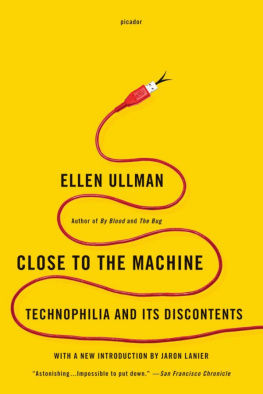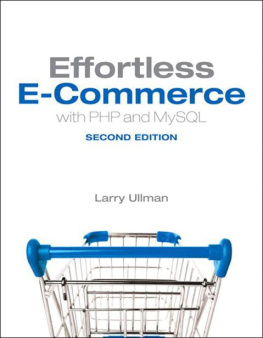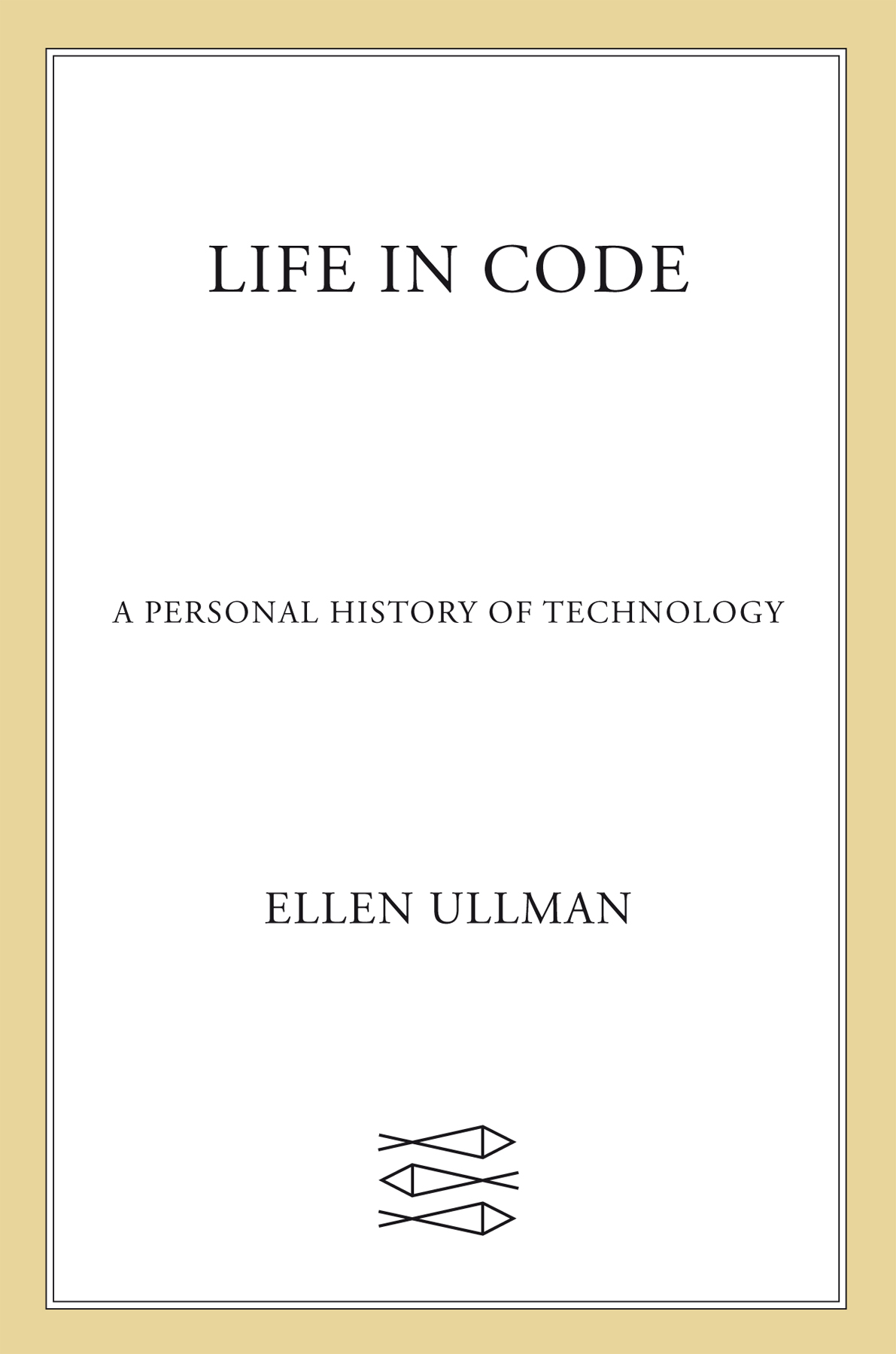Contents
Guide
Pagebreaks of the print version

The author and publisher have provided this e-book to you for your personal use only. You may not make this e-book publicly available in any way. Copyright infringement is against the law. If you believe the copy of this e-book you are reading infringes on the authors copyright, please notify the publisher at: us.macmillanusa.com/piracy.
To Elliot Ross,
the photographer, my husband, and most loyal, truthful,
and gently demanding editorwith love
The years shown on each chapter reflect the time it was written.
1994
I.
People imagine that programming is logical, a process like fixing a clock. Nothing could be further from the truth. Programming is more like an illness, a fever, an obsession. Its like riding a train and never being able to get off.
The problem with programming is not that the computer isnt logicalthe computer is terribly logical, relentlessly literal-minded. Computers are supposed to be like brains, but in fact they are idiots, because they take everything you say at face value. I can say to a toddler, Are yew okay tewday? and the toddler will understand. But its not possible for a programmer to say anything like that to a computer. The compiler complains; finds a syntax error; wont translate your program into the zeros and ones of the machine. Its not that a program cant be made to act as if it understandsit can. But thats just a trick, a trick of the code.
When you are writing code, your mind is full of details, millions of bits of knowledge. This knowledge is in human form, which is to say rather chaotic, coming at you from one perspective, then another, then a random thought, then something else important, then the same thing with a what-if attached. For example, try to think of everything you know about something as simple as an invoice. Now try to tell an alien how to prepare one. That is programming.
A computer program is an algorithm that must be written down in order, in a specific syntax, in a strange language that is only partially readable by regular human beings. To program is to translate between the chaos of human life and the line-by-line world of computer language.
You must not lose your own attention. As the human-world knowledge tumbles about in your mind, you must keep typing, typing. You must not be interrupted. Any break in your listening causes you to lose a line here or there. Some bit comes; thenoh noits leaving, please come back. It may not come back. You may lose it. You will create a bug and theres nothing you can do about it.
Every single computer program has at least one bug. If you are a programmer, it is guaranteed that your work has errors. These errors will be discovered over time, most coming to light after youve moved on to a new job. But your name is on the program. The code library software keeps a permanent record card of who did what and when. At the old job, they will say terrible things about you after youve gone. This is normal life for a programmer: problems trailing behind you through time, humiliation in absentia.
People imagine that programmers dont like to talk because they prefer machines to people. This is not completely true. Programmers dont talk because they must not be interrupted.
This inability to be interrupted leads to a life that is strangely asynchronous with the one lived by other human beings. Its better to send email than to call a programmer on the phone. Its better to leave a note on the chair than to expect the programmer to come to a meeting. This is because the programmer must work in mind-time but the phone rings in real time. Similarly, meetings are supposed to take place in real time. Its not just ego that prevents programmers from working in groupsits the synchrony problem. To synchronize with other people (or their representation in telephones, buzzers, and doorbells) can only mean interrupting the thought train. Interruptions mean certain bugs. You must not get off the train.
I used to have dreams in which I was overhearing conversations I had to program. Once, I had to program two people making love. In my dream they sweated and tumbled while I sat with a cramped hand writing code. The couple went from gentle caresses to ever-widening passions, and I despaired as I tried desperately to find a way to express the act of love in the computer language called C.
II.
I once had a job where I didnt talk to anyone for two years. Here was the arrangement: I was the first engineer hired by a startup software company. In exchange for large quantities of stock that might be worth something someday, I was supposed to give up my life.
I sat in a large room with two recently hired engineers and three Sun workstations. The fans of the machines whirred; the keys of the keyboards clicked. Occasionally, one or another of us would grunt or mutter. Otherwise, we did not speak. Now and then, I would have a temper outburst in which I pounded the keyboard with my fists, setting off a barrage of beeps. My colleagues might look up but never said anything about this.
Once a week, I had a five-minute meeting with my boss. I liked him; he was genial; he did not pass on his own anxieties about working in a startup. At this meeting I would routinely tell him I was on schedule. Since being on schedule is a very rare thing in software engineering, he would say, Good, good, see you next week.
I remember watching my boss disappear down the row of cubbyhole partitions. He always wore clothes that looked exactly the same: khaki pants and a checked shirt of the same pattern. So, week to week, the image of his disappearing down the row of partitions remained unchanged. The same khaki pants, the same pattern in the checked shirt. Good, good, see you next week.
Real time was no longer compelling. Days, weeks, months, and years came and went without much physical change in my surroundings. Surely I was aging. My hair must have grown, I must have cut it; it must have grown again. Gravity must have been working on my sedentary body, but I didnt notice. I only paid attention to my back and shoulders because they seized up on me from long sitting. Later, after I left the company, there was a masseuse on staff. That way, even the back and shoulders could be soothedall the better to keep you in your seat.
What was compelling was the software. I was making something out of nothing, I thought, and I admit the software had more life for me than my brief love affair, my friends, my cat, my house, my neighbor who was stabbed and nearly killed by her husband. I was creating (creatingthat is the word we used) a device-independent interface library. One day, I sat in a room by myself surrounded by computer monitors from various manufacturers. I remember looking at the screens of my companions and saying, Speak to me.
I completed the interface library in two years and left the company. On my last day on the job, the financial officer gave me a check: it was a payment to buy back most of my stock. I knew this was coming. When I was hired Id signed an agreement: the price of leaving before five years was the return of the stock. Still, I didnt feel free or virtuous. I put the check in my pocket, then got drunk at my farewell party.
Five years later, the company went public. For the engineers whod stayed, the original arrangement was made good: in exchange for giving up seven years of their lives, they became very, very wealthy. As for me, I bought a car. A red one.












